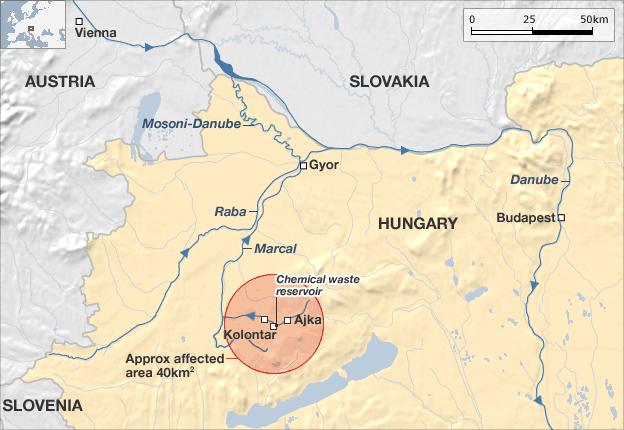Hungary builds wall to slow possible new sludge wave
- Published
BBC's Duncan Kennedy: "All those tractors and diggers are building a fresh dam to try and stop any future flows"
Hungarian work crews are racing against time to build an emergency dam as cracks widened at a burst reservoir that spilled toxic sludge.
The wall of the reservoir could collapse within a day or a week, Environment State Secretary Zoltan Illes said.
A new wall is being built to protect villages already devastated by the flood of industrial waste on 4 October.
At least seven people have died as a result of the accident.
Hungarian media quoted Mr Illes as saying that a 25-metre-long crack in the weakened wall of the reservoir near Ajka had widened slightly by Sunday morning and that the wall of the damaged reservoir now looked beyond repair.
He said it was especially important to finish the new protective wall before new rainfall, expected in the next few days.
"Once the rain is here, the remaining sludge will be washed out and the the dam's northern sections is going to break away," Mr Illes said.
The new wall is to be 600m (656yd) long and 5m to 7m high, officials said.
Evacuation plans
Repair work has also continued on the reservoir itself amid fears that what is already Hungary's worst environmental disaster could even get worse.
Around 150 people were injured, with many receiving burns, by the spill of up to 700,000 cubic metres (24.7m cu ft) of red toxic sludge.
The highly alkaline substance is a by-product of aluminium production and has a caustic effect on the skin. It contains heavy metals, such as lead, and inhaling its dust can cause lung cancer.
Most of those killed were drowned or swept away in Kolontar as the sludge hit on Monday. The village is the closest to the reservoir, and would be expected to bear the brunt if there were a second spill.
On Saturday about 800 residents of the village were evacuated to the town of Ajka, 8km (five miles) away.

Police also told residents of the neighbouring town of Devecser to pack a single suitcase so they could leave quickly if necessary.
Another 500,000 cubic metres of waste could escape if the reservoir wall was breached again, Prime Minister Viktor Orban said on Saturday.
In the last few days residents and emergency workers have worked around the clock to remove the worst of the sludge, which has damaged houses, streets and farmland and polluted waterways.
All life in the Marcal river, which feeds the Danube, is said to have been extinguished.
The sludge reached the Danube on Thursday, but Hungarian officials said on Friday that the pH level in the river was "normal", easing fears that Europe's second longest river would be significantly polluted.
Emergency crews have been working to dilute the alkaline content of the spill, adding huge quantities of gypsum and chemical fertilisers to the waters of the Marcal and Raba rivers.
The company responsible for the alumina plant, MAL Hungarian Aluminium Production and Trade Company, has offered its condolences to the families of the bereaved but insists it did nothing wrong.
It said it was devoting "all its energies and efforts" to tackling the spill, and had released 110,000 euros (£96,000) so far to help with the clean-up.
- Published9 October 2010
- Published8 October 2010
- Published8 October 2010
- Published8 October 2010
- Published6 October 2010
- Published7 October 2010
- Published5 October 2010